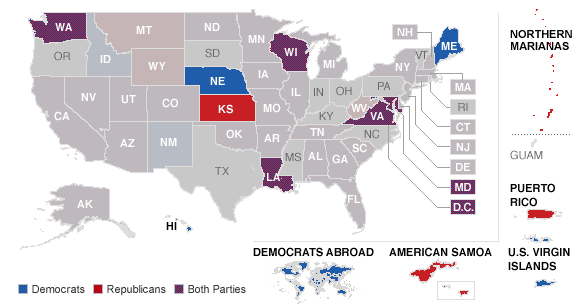


As the primary season is well upon, and primaries and caucuses are being held in each state, the delegate process is also in full swing. The delegate process is simple at first glance. A candidate must receive a majority of the delegates awarded. In the recent past, most of the time a candidate will receive a majority of the delegates, with no real problem. For the Republicans, the number of delegates needed is 1,191, and for the Democrats it is 2,025. One would think that who ever wins more primaries and amasses more votes would be the winner as the delegates are bound by how their state votes. While this is the case with the Republicans, the Democrats is a bit different. They have not only delegates selected by the vote of the state, but they also have a series of "super delegates." These are a system of party elected leaders, such as governors, congressmen, and Democratic National Committee members.
Information received from: http://www.cnn.com/2008/POLITICS/01/02/delegate.explainer/index.html
As I am sure you all are aware, this primary season there has been a big fuss over these so called super delegates. The delegates awarded by the states based on the vote of that state are all pledged delegates and must vote for the candidate they pledged to vote for. However, super delegates are unbound and can vote for any candidate they please. For instance, in the state of Massachusetts, Hillary Clinton won by 15%. The pledged delegates are easy here, she won the state, so she wins more delegates. However some of the super delegates in this state, such as big names like Senator Ted Kennedy, Senator John Kerry, and Governor Deval Patrick, have all endorsed Clinton's competitor Barack Obama. A major criticism is that these super delegates are not bound by the will of the people. Even though a majority of people voted for Clinton in Massachusetts, some of the super delegates in the state like Kennedy and Kerry, are free to vote for Obama at the convention. Now, while Obama is ahead in pledged delegates, and he has won more states, Clinton is ahead in super delegates. A main concern by many Democrats is that even if Obama wins more pledged delegates, but does not receive a majority of the delegates (2,025), Clinton could win the nomination. Many feel this is undemocratic, and that the super delegates should cast their vote for either who won their state, or the candidate who has the most pledged delegates at the end. Some feel the super delegates should vote based on the will of the people.
Article from and info received on super delegates from:
http://demconwatch.blogspot.com/2008/01/superdelegate-list.html
Now, all this talk about the will of the people reminds me of an individual from our studies in class. This person is Andrew Jackson. In 1824, the will of the people was to vote Andrew Jackson into office. He won the popular vote, but in a crowded field of presidential candidates, he did not win a majority of the electoral vote. So the race went to the House of the Representatives, where Jackson's opponent, John Quincy Adams won, even though more people voted for Jackson. He felt that the will of the people was not listened to. Four years later, Andrew Jackson won, and in 1832, he won reelection. In that 1832 election, he won a majority of the electoral and popular vote. He based his claim on the will of the people, as the majority of those who voted, voted for him. He was able to base a lot of his policies, like vetoing the national bank charter bill, based on the will of the people.
It is interesting that the super delegate process today and what happened in the 1820's and 1830's are similar as both Jackson and opponents of the super delegate process base their claims on the coveted "will of the people."
1 comment:
I do not agree with the idea of the Super Delegate. I feel that is we base this country on the idea of the "will of the people," just as this post is entitled, than our political policy does not match our theory. When we let a super delegate have complete reign and control over their vote, as opposed to having them bound to vote with the people, it completely violates the entire purpose of having a primary election. Although the delegates that are bound are truly required to vote with the will of the people, and this validates the primary elections in a state, the super delegate poses many more of a problem. In my opinion, this shows a corrupt society. I feel that this system encourages bribery and corrupt practicing of politics. As discussed in the original post, the state of Massachussetts came out with Hilary Clinton as the winner of their primary election, but most of the super delegates have pledged their support for Barack Obama. How does this make an election fair? How can we truly expect a leader to be elected by the people if the delegates can choose who they want? This creates a mini aristocracy of people who can band together to sway an entire election to elect the cantidate which they want to? This is not true democracy, but rather corrupt politics. I truly believe that this system needs to be revisited and revamped, because it does not truly envelop the will of the people properly.
Post a Comment